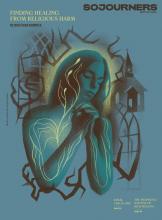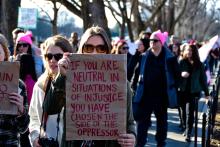Feminism

Like any Black man, I’ve had no choice but to learn how to navigate racism. But as a man, I’ve had to intentionally educate myself and correct my own sexist behavior.
Men often fear critiques of patriarchy, but I want to keep learning about feminism, which I understand to be the fight for women’s right to self-determination. I was taught to believe that a woman’s central purpose is to serve men’s needs — a message that came from both religious and secular sources. But I am learning that I can challenge that message.
With a feminist framework, I can see that my socialization into gender roles started early. My parents, mass media, the education system, and the church were all part of training me — sometimes overtly and sometime subtly — to believe that because I was male, I was superior to women.

In July of last year, an estimated 50,000 fans flooded Arrowhead Stadium in Kansas City to see Taylor Swift’s Eras Tour concert. Among those in the crowd was football tight end Travis Kelce, eager to woo Swift. Arrowhead has been central to Swift and Kelce’s romance ever since: After making their romance official last September, Swift has routinely joined the 76,000 Chiefs fans to cheer for Kelce and his teammates. From concertgoers to sports spectators, the thought of that many people in the same space is difficult to imagine. Equally hard to imagine, and significantly more heartbreaking, Israel Defense Forces have killed 25,000 Palestinians since Oct. 7, 2023; that number of people would fill about a third of Arrowhead Stadium.
This is a jarring image, but such is the reality of our present moment: While the state of Israel carries out a genocide against Palestinians, we are easily distracted by our adoration for Swift and Kelce, along with spectator sports.

There is not much that Rebecca Jane Morgan appreciates about Pat Robertson, the right-wing evangelical pastor and political figure who died in June. But one moment from his life sticks out in her mind. In 2013, Robertson was asked on-air about gender affirmation surgeries (referred to as a “sex-change” surgery). The usually hardline conservative offered a nuanced answer. “I don’t think there’s any sin associated with that,” Robertson said. “I don’t condemn somebody for [pursuing gender affirmation surgeries].”

SEVERAL OF THIS month’s lectionary readings deal with the tensions of navigating wrongdoing, judgment, vengeance, and forgiveness. They call readers to forgive — and forgive again: not just once, twice, or seven times, but at least 77 times and counting (see Matthew 18:22).
These texts have been used throughout history to trap people in positions of disempowerment, abuse, and enslavement. Consider, for example, how victims of intimate partner violence have been pressured to forgive and return to their abusers, who then proceed to hurt them again. Or how entire marginalized communities are expected to “get over it,” whether that is the colonization of Turtle Island, enslavement, or generations of misogynist, queer- and transphobic policies, laws, and violence. In light of the rampant misuse of these texts, we’re right to be wary of biblical interpretations for how to handle conflict that reinforce domination. The texts tend not to deal directly with inherent interpersonal and structural power dynamics. We must do that work ourselves. Any of us preaching the lectionary this month must also be careful.
Attending to the power dynamics of these passages doesn’t mean we dismiss them as useless. Rather, such attention helps us discern how these texts invite and bear witness to God’s presence in processes of interpersonal, intergenerational, and even international healing. They call us to attend to what our own pain has to teach us and to seek hope through community life. And they promise that throughout our attending, God will abide — waiting patiently to see us through.

IN RATTLING THOSE DRY BONES: Women Changing the Church, activist and author Susan Cole writes an essay in response to the question, Why do I remain in the church? In her answer, she shares how she healed her relationship with God through the figure of Sophia, who she defines as “the Wisdom of God, the divine imaged as female.” Cole writes, “Through [Sophia] I have discovered in a whole new way, divine presence within myself, within my sisters, within all that is.” Cole’s portrait of a female God, filled with kindness and joy, stands in stark contrast to the millennia of androcentrism that shapes Christian teaching and practice. The treasure of the Christian female godhead remains buried, but it can be uncovered.
Sophia sits (metaphorically) at artist Judy Chicago’s “The Dinner Party,” the famed feminist installation anchored by an enormous triangular banquet table, 48 feet long on each side. From 1974 to 1979, Chicago scrupulously created unique, historically precise place settings for 39 “guests of honor,” female figures both mythical and historical, ranging from Mother Earth to Georgia O’Keeffe. An additional 999 names appear written on tiles surrounding the table. According to Brooklyn Museum curators, at Chicago’s table Sophia stands as a powerful “creative force in the universe” and a cross-cultural symbol of a female God. And the elements of Sophia’s place setting — a flower plate with watery petals and a runner made from remnants of a wedding veil — symbolize Christianity’s role in “the downfall of female power, particularly religious power.” On a grand scale, “The Dinner Party” reminds us of what patriarchy has erased.

Healing from religious harm: Why compassionate community is part of the journey.

THERE'S NEVER A bad time to show a woman you value that she’s a woman of valor. But there are bad gifts. Just because your favorite Jesus feminist loves Mary Oliver, for instance, doesn’t mean you should gift her a wild goose — no matter how harsh and exciting the goose may be. Also, do not arrange a telegram delivered to her by a man dressed in a gazelle outfit reading the Song of Songs; her parents might be over for Sunday dinner! And I can’t emphasize this enough: Do not gift her an animatronic infant in a basket floating down a river. I learned that one the hard way.
But don’t worry, there are plenty of other options:

“Wisdom speaks her own praises, in the midst of her people she glories in herself.” What a luscious, full-bodied image from the biblical book of Sirach (24:1). Wisdom has sass! In an increasingly combative society, I’m drawn to Sirach’s prudence, poetic excess, and the authoritative agency of Lady Wisdom.
I’ve been keeping phrases from Sirach, also known as Ecclesiasticus, in mind as post-Roe legislation rolls across the states. The health of women and children (born and unborn) has been weakened, rather than strengthened. Political and social platforms ring out with dangerous nonsense about making criminal statutes apply at the time of fertilization, allowing the death penalty for abortion, or, conversely, promoting violence against “pregnancy crisis centers.”
How do we stop the howl when we feel urgently that lives are on the line? Sirach, which is part of the Catholic canon, says, “The fear of God is an abundant garden; its canopy higher than all other glory” (40:27). “Fear” means “body-trembling awe” before our Creator. Amid so much that I don’t understand and don’t know what to do about, this strange scriptural juxtaposition feels like Lady Wisdom speaking to our present condition.

THREE YEARS AGO, I joined a struggle for what I view as the most transformational justice reform today: change to the U.S. Constitution. The change I advocate is at once unbelievably simple and profoundly radical: for Americans to agree that all citizens enjoy equal rights under law, whatever their gender or sexual orientation. It’s time to recognize the Equal Rights Amendment. Equality is central to most contemporary theories of justice. A majority of Americans puzzle why our nation has failed to live up to the promise of equality in our democracy. So why aren’t women protected equally?
“The ERA is dead,” opponents argue, laid to rest by an arbitrary time limit that was negotiated into the prelude of the bill Congress passed in 1972. A procedural objection seems a weak theory to lead with, in response to the unrequited aspirations of half the citizenry for basic human rights. Whatever the amendment’s merits, many claim, it cannot be revived. And yet miraculously, it has been. And women everywhere are testifying to this resurrection.
This is fitting, isn’t it? It was women, after all, who first testified to the resurrection. This Easter, we read how Mary Magdalene and the other Mary meet an angel at Jesus’ tomb, who commissions them to tell the disciples he is risen. The guards are too terrified to move, but the women rush to fulfill their divine calling (see Matthew 28).

Wrestling with the complicated legacy of Christians and international adoption.

One of the biggest gleanings from Mrs. America is that women and their motivations for power are complicated and far from monolithic.

IT'S A WARM September morning, and roughly 20 women are gathered in a women-only coworking space in Brooklyn. After brief introductions, a poem honoring the first month of the Muslim calendar, and a hymn from the Church of Jesus Christ of Latter-day Saints (widely known as the Mormon church), Abby Stein speaks about the upcoming Jewish High Holy Days.
Stein grew up in a strict Orthodox Jewish community and was assigned to be male at birth. From a young age, she says, she knew she was a girl, but didn’t have the vocabulary to describe what she was feeling. Gender roles were so strict in her community that, according to Stein, the concept of being gay or transgender simply didn’t exist.
“Forget separate roles,” Stein tells me. “Men and women aren’t even supposed to interact.”
For several years beginning when she was 9, Stein prayed every night that God would make her a girl while she slept. She began questioning her belief in God: “How can I trust my parents and teachers about something as big as God and religion that touches our entire lives when they could be mistaken about something so existential as who I am?”
Stein got married, was ordained as a rabbi, and had a son. But by her early 20s, it wasn’t working. She watched YouTube to learn English (she’d previously spoken only Yiddish and Hebrew), studied for her GED, and eventually left the community. She came out as transgender while an undergraduate at Columbia University and is now an activist in both transgender and formerly Orthodox communities.
Stein has found a new home in several LGBTQ-inclusive Jewish spaces, but she finds them limiting. “All of these communities, even the ones as progressive as they are, they still follow a very set tradition,” she says. At the September gathering, Stein discusses the biblical story of Ruth and her mother-in-law, Naomi, who share a deep love that some consider romantic. “If you ask me,” says Stein, with a half-joking grin, “everyone in the Bible is queer.”
Things are different at Sacred Space, a multifaith gathering that meets on the first Sunday of every month. The gathering is both a refuge for women who have left their religious traditions and a seminar for those who still hope to change their faith communities from within. No one religion is playing host. Everyone is welcome to bring their own traditions; only sexism, racism, homophobia, and other forms of exclusion are off the table.

Vitoria thought it was strange when her church’s youth-group leader asked her if he could come to her house to talk about upcoming plans for the group. Vitoria, 18 at the time, had been active in First Baptist Church of Rio Doce in Olinda, Brazil. Recently, though, she had been attending youth services at a friend’s nearby church.
The youth-group leader arrived at Vitoria’s home and asked to use the bathroom. When he came out, she said, he held out his cell phone to show her something. “When he came in and was going to show me the plans, he reached around my back and tried to unclasp my bra,” Vitoria said.
Vitoria asked him what he was doing. Then, she said, he dragged her into her bedroom and raped her.
“Here in Brazil, the movement has gone in the opposite direction”
While Brazil’s Carnival celebrations are famous for their libidinous nature, less well known are the expectations that women in the country “stay in their place.”

The House Judiciary Committee today held the first hearing on the Equal Rights Amendment in 36 years. The ERA affirms that, “Women shall have equal rights in the United States and every place subject to its jurisdiction. Equality of rights under the law shall not be denied or abridged by the United States or by any State on account of sex.” If the ERA passes, the word “women” would appear in the Constitution for the first time in history.

One particularly welcome development at the Met Gala was seeing the mail coif associated with Joan adopted by women of colour such as Priyanka Chopra and Zendaya. This move distanced the saint from her recent nationalist and racist recruitment by Marine Le Pen of France’s Front National and reclaimed her as an icon of ferocity for all women.

Sexism is dead. So sayeth most men, according to a national survey in August. Women, on the other hand, aren’t quite convinced.
The poll by the Pew Research Center found that 56 percent of men, and only 34 percent of women, said they thought that “sexism no longer was a barrier” to women in this country. (A pair of adjacent headlines on washingtonpost.com summed it up: “Sexism is over, according to most men” immediately preceded “It’s 2016, and women still make less for doing the same work as men.”)
So, welcome to “post-sexist” America.
I imagine it will look a lot like the “post-racist” America that Barack Obama’s election in 2008 supposedly ushered in. At that time, a few days after Obama’s historic election, The Wall Street Journal wrote that “Barack Obama’s election as the first black U.S. president promises to usher in a new era of race relations.”
The paper quoted a senior Obama adviser as saying, “People say he is a post-racial candidate. When people say that, they seem to suggest that we are beyond the issue of race, that issues of race don’t matter.” But Obama will tell you, she continued, that “he thinks race does matter.”
Turns out the president was right.
AND NOW, if the country elects its first woman president this fall, will it be seen as a sign that the country has moved into a new era regarding justice and equality for women?
The campaign itself, of course, hasn’t been encouraging. Some wonder if the level of vitriol aimed at the first woman to receive a major-party presidential nomination is due in large part to the fact that she’s, well, a woman.
Over the last 50 or 60 years, overt sexism—like overt racism—has been made less and less socially acceptable. But a look at basic statistics for, say, women in leadership positions—from CEOs at top companies (4 percent) to members of Congress (19 to 20 percent)—should dispel the delusion that we live in an egalitarian society.

The Women’s March in 2017 was one of the largest protests in history. Why is it that coworkers and friends who are active in social justice movements did not even realize that the march was taking place again this weekend? Why is it that I am still explaining why it was important for me to attend?

Gay is a true prophetic voice. She laments her life, her trauma, and her weight. She doesn’t promise victory but speaks to the pain that so many people feel: victims and survivors of sexual violence, bisexual people, fat people, and lonely people.

At first glance, the meaning behind this tagline for Wonder Woman feels obvious, it is the next step on the DC franchise road to November’s Justice League movie. But of course, there’s more to it than that. Wonder Woman marks a feminist milestone, too, one that feels like artistic justice: it’s the first major superhero movie to feature a female hero, and the first to use a female director, Patty Jenkins.

The updated, live-action version of the film, out this weekend, manages to make the development of its central romance a little more redemptive. It’s mainly a recreation of the original film, but manages to squeeze in some additional context that make its characters more fully-rounded, and their circumstances more understandable. But while this progressive package [complete with a more diverse cast and LGBTQ-friendly supporting characters] is a bit easier to swallow, the core problem of the story still remains.